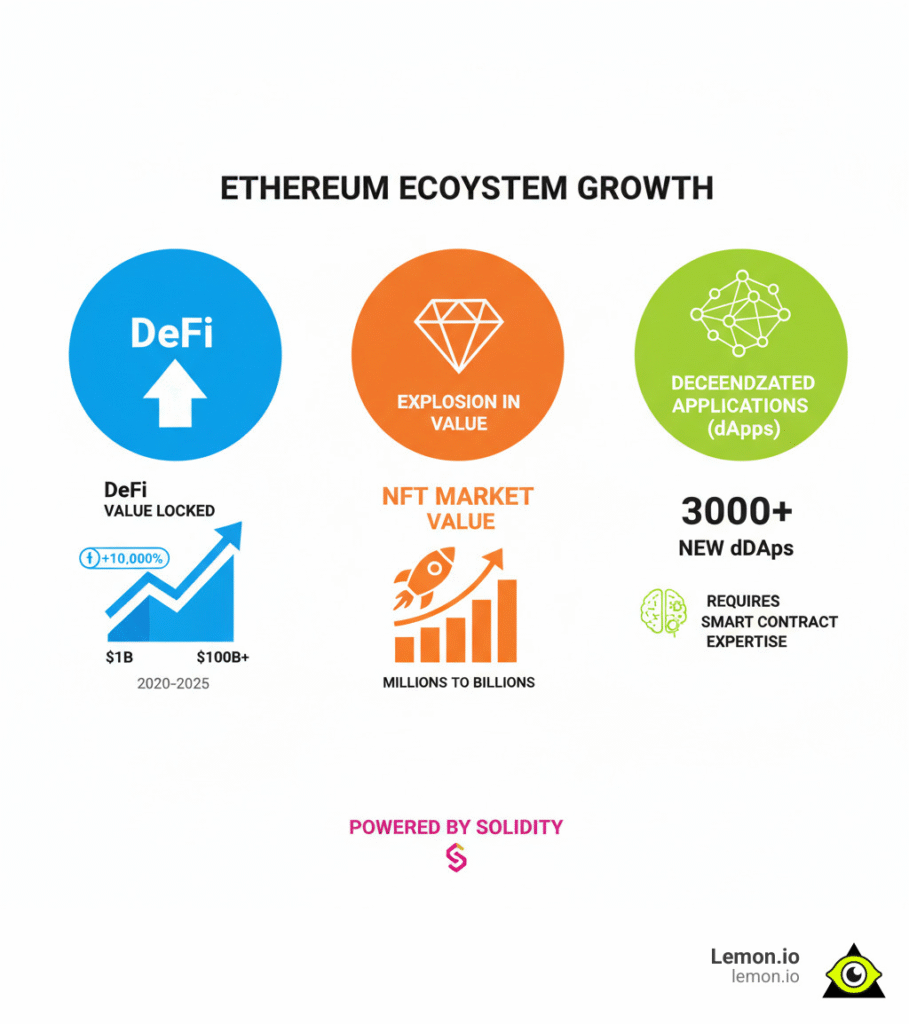When you need to hire Solidity developers, you’re entering one of tech’s most competitive talent markets. The blockchain industry has exploded, with job postings up 118% year-over-year and senior Solidity salaries ranging from $120,000 to $250,000 annually.
Quick Guide to Hiring Solidity Developers:
- Average hourly rates: $50-$200 for freelancers
- Hiring timeline: 48-72 hours on specialized platforms vs. 60+ days with traditional methods
- Key skills: Smart contract development, security auditing, gas optimization, Web3.js integration
- Where to hire: Specialized blockchain platforms, freelance marketplaces, or development agencies
- Budget: Location impacts cost (e.g., North America vs. Latin America/Eastern Europe)
The growth of decentralized finance (DeFi), NFTs, and Web3 applications has created massive demand for developers who can write secure, efficient smart contracts. Over 60% of Web3 companies struggle to find top-tier Solidity talent, and over 80% of blockchain security breaches stem from smart contract vulnerabilities.
This scarcity leads to fierce competition. Solidity developers earn up to 30% more than traditional software engineers, and over 70% prefer remote work. The challenge isn’t just finding developers, but finding the right ones who grasp the technical and security complexities of blockchain.
I’m Aleksandr Volodarsky, and I’ve helped scale development teams from $2.7M to $10M at Lemon.io. We specialize in connecting companies with pre-vetted blockchain talent, and our rigorous process has taught us what separates good Solidity developers from great ones for mission-critical projects.

Understanding the Solidity Landscape
Solidity is the programming language reshaping applications, contracts, and digital ownership. It’s the backbone of the Web3 revolution, powering everything from million-dollar NFT sales to decentralized finance (DeFi).
What is Solidity and Why is it Crucial for Web3?
Solidity is the native language of the Ethereum blockchain, allowing developers to write immutable rules into the digital world. Created in 2014 for smart contracts, it enables self-executing agreements where terms are written in code and automatically enforced by the blockchain. Once deployed, a smart contract runs exactly as programmed without human intervention or middlemen.
Solidity powers the Ethereum Virtual Machine (EVM), a global, decentralized computer. Every dApp, DeFi protocol, and NFT marketplace runs on Solidity. While its syntax is similar to JavaScript, writing Solidity requires a different mindset, as developers create digital laws governing high-value transactions.
For a technical deep dive, visit The official Solidity language portal.
Key Features and Business Benefits
The features of Solidity are driving businesses to hire Solidity developers at record rates.
- Turing complete: It can handle any computational problem, from simple tokens to complex wallets.
- Object-oriented: Principles like inheritance allow for reusable, modular components, simplifying development and debugging.
- Static typing: The compiler catches errors before deployment, which is crucial when a single bug could cost millions.
- EVM compatibility: Contracts work across hundreds of blockchains, enabling a “write once, deploy everywhere” approach.
For businesses, these features offer competitive advantages. Transparency is built-in, as all transactions are visible on the blockchain, fostering customer trust. Automation eliminates operational costs like payment processing fees and manual verification. Properly audited Solidity code also provides unprecedented security. Most importantly, it open ups innovation opportunities by allowing companies to program money, create digital assets, and build applications that never go offline.
This technology fundamentally changes how we view data integrity. Learn more about how blockchain impacts data integrity.
Market Trends: The Soaring Demand for Solidity Developers
The data is clear: blockchain-related job postings have skyrocketed 118% year-over-year, with Solidity developers in highest demand.
Senior developers command salaries from $120,000 to $250,000 annually—up to 30% more than traditional software engineers—while freelancers earn $50-$200 per hour. This is driven by a severe supply-demand imbalance, with over 60% of Web3 companies struggling to find qualified talent. The need is for developers who understand security, gas optimization, and production-ready architecture.
As a result, companies offer competitive packages, and over 70% of Solidity developers prefer remote work. Traditional hiring methods are failing, and companies that succeed are those who understand that to hire Solidity developers is to secure a stake in the future of digital business.
Defining the Ideal Solidity Developer Profile

When you hire Solidity developers, you’re seeking architects and security experts who can turn your Web3 vision into a secure reality.
Typical Roles and Responsibilities
A top-tier Solidity developer’s role is diverse and critical for safeguarding decentralized applications:
- Smart Contract Development and Architecture: They write, test, and deploy secure, efficient smart contracts, designing the underlying structure for everything from ERC-20 tokens to complex DeFi protocols.
- dApp Integration: They connect smart contracts with user-facing front-ends (using React, Vue.js, etc.) and back-end services to create seamless decentralized applications.
- Security Auditing and Implementation: With over 80% of blockchain hacks stemming from contract vulnerabilities, developers must identify and fix weaknesses, implement best practices, and work with auditors.
- Gas Cost Optimization: They optimize code to minimize transaction costs (“gas”) on the Ethereum blockchain, making dApps more affordable for users.
- Cross-Chain Solutions Development: They build bridges and protocols that enable assets and data to move securely between different blockchains.
- Technical Documentation and Community Contributions: They produce clear documentation and often contribute to open-source projects, strengthening the ecosystem.
A developer’s ability to implement smart contracts directly impacts a project’s functionality and security. Find out more about How developers implement smart contracts.
Essential Skills and Qualifications to Look For
When vetting talent, prioritize demonstrable skills over a fancy CV.
Technical Skills:
- Solidity Programming Proficiency: Deep understanding of syntax, data structures, and advanced concepts like proxies and upgradeable contracts.
- Blockchain Principles: Solid grasp of consensus mechanisms (PoW vs. PoS), the EVM, transaction processing, and overall blockchain architecture.
- Smart Contract Security Best Practices: Knowledge of common vulnerabilities (reentrancy, overflow/underflow) and mitigation patterns using libraries like OpenZeppelin.
- Testing and Debugging: Experience with frameworks like Hardhat, Truffle, and Waffle, plus debugging tools like Remix and Ganache. Learn More about popular blockchain development frameworks.
- Frontend Integration: Familiarity with libraries like Web3.js or Ethers.js to connect contracts with web applications.
- Development Tools: Fluency with Hardhat, Truffle, Remix, Ganache, OpenZeppelin, and VS Code extensions.
Soft Skills:
- Problem-Solving: Ability to solve complex and novel technical challenges.
- Attention to Detail: Meticulousness is a necessity, as a single error can be catastrophic.
- Adaptability: A quick learner who keeps pace with the fast-moving Web3 space.
- Communication: Clear and concise communication for effective remote collaboration.
- Collaboration: Works well in a team, provides constructive feedback, and contributes to a shared vision.
The Ultimate Guide to Hire Solidity Developers
Knowing where to look and how to evaluate talent makes all the difference when hiring a Solidity developer.
Exploring Different Hiring Models
When you hire Solidity developers, you have three main options:
- In-house teams offer maximum control and cultural integration. However, this path is slow (60+ days to hire) and expensive, requiring salaries, benefits, and overhead.
- Freelance platforms provide speed and flexibility for specific tasks. The challenge is that quality varies wildly, and you must spend significant time vetting candidates yourself.
- Specialized talent platforms like Lemon.io offer a balanced solution. We pre-vet developers, accepting only the top 1%, so you can hire an expert in 48-72 hours. This combines the speed of freelancing with the quality of a vetted hire, all with month-to-month flexibility.
Here’s how these options stack up:
Hiring Model |
Cost |
Speed |
Control |
Quality |
|---|---|---|---|---|
In-house |
High (salaries, benefits, overhead) |
Slow (60+ days) |
High (direct management) |
Variable (depends on internal vetting) |
Freelance Platforms |
Low-Medium (hourly/project-based) |
Fast (days-weeks) |
Low (less commitment) |
Highly Variable (self-vetted) |
Specialized Platforms |
Medium-High (vetted talent) |
Very Fast (48-72 hours for matches) |
Medium-High (direct work, flexible terms) |
High (rigorous, manual vetting) |
How to Evaluate and Select the Right Candidate
Finding a great Solidity developer requires looking beyond resumes to uncover genuine problem-solving ability and security awareness.
- Start with a clear job description. Specify the Solidity version, required experience (e.g., DeFi), and preferred testing frameworks to attract the right candidates.
- Conduct technical screening. Review their GitHub for clean, well-documented code and open-source contributions to understand their thought process.
- Use practical coding challenges. Ask candidates to optimize a gas-heavy contract or identify security flaws in sample code. This reveals technical skill and security mindset.
- Review their portfolio. Ask about contracts they’ve deployed to mainnet and the architectural decisions behind their projects. Real-world experience is invaluable.
- Assess cultural fit. Ensure they can communicate clearly and collaborate with your team. Soft skills are crucial for long-term success.
Understanding best practices for testing blockchain applications will help you evaluate a candidate’s thoroughness.
Challenges and Best Practices When You hire solidity developers

The Solidity hiring landscape has unique challenges:
- Fierce competition: You’re competing against well-funded crypto companies for a limited talent pool. Over 60% of Web3 companies struggle to find quality developers.
- Difficult skill verification: Buzzwords can mask a shallow understanding. It’s hard to verify if a developer can write secure, gas-efficient code.
- Critical security mindset: With 80% of hacks from contract vulnerabilities, a developer’s security awareness is paramount.
- High compensation: Senior developers command $120,000-$250,000 annually. Lowball offers will fail.
- Demand for remote work: Over 70% of blockchain developers expect remote flexibility.
To succeed, prioritize hands-on experience over formal degrees and avoid rushed decisions. A bad hire is expensive in salary, security risks, and project delays.
Leveraging specialized platforms like Lemon.io mitigates these issues. Our manual vetting process connects you with the top 1% of applicants in 48-72 hours, so you can focus on building, not recruiting.
Ensuring Quality, Security, and Cost-Effectiveness
When you hire Solidity developers, you’re making a strategic investment. The key is to balance cost with quality and security to maximize your return.
What are the Costs to hire solidity developers?
The cost to hire a Solidity developer varies based on several factors:
- Experience: Junior developers (1-3 years) may charge $10-$25 per hour, while senior experts command $50-$200 per hour. The average freelance rate is often $81-$100 per hour.
- Geography: North American developers might charge $70-$100 per hour, while equally skilled talent in Poland, Ukraine, or Mexico may cost $75-$95 per hour. Global talent platforms can offer significant savings without sacrificing quality.
- Engagement Model: Freelance rates can be higher for short-term work, while dedicated developers offer predictable monthly costs for long-term integration.
Don’t overlook gas optimization skills. A developer who writes efficient contracts may charge more upfront but can save your project thousands in long-term operational costs.
Ensuring Smart Contract Security and Code Quality

In blockchain, security is everything. Crypto hacks cost the industry billions, and 80% of breaches stem from smart contract vulnerabilities. Cutting corners here is not an option.
- Rigorous Testing: A developer must use test-driven development (TDD) with comprehensive unit and integration testing via frameworks like Truffle and Hardhat.
- Code Reviews: Multiple developers should review all code to catch errors that a single person might miss.
- Professional Security Audits: For mission-critical contracts, third-party audits are non-negotiable. They provide an external check for vulnerabilities.
- Vulnerability Awareness: Your developer must understand and mitigate common threats like reentrancy attacks, integer overflows, and access control issues, often using libraries like OpenZeppelin.
At Lemon.io, our vetting process specifically tests for security awareness to ensure developers can write secure code. Investing in quality upfront prevents devastating losses later. For a deeper dive, see the key security concerns when developing with Solidity. The most expensive developer is the one whose code gets hacked.
Frequently Asked Questions about Hiring Solidity Developers
Here are answers to common questions from companies looking to hire Solidity developers.
How long does it take to hire a good Solidity developer?
The timeline depends on your approach. Traditional hiring, with job ads and manual screening, often takes 60+ days due to fierce competition for specialized talent.
Specialized platforms like Lemon.io are much faster. Because we have a pool of pre-vetted, interview-ready developers, we can match you with an expert in just 48-72 hours. For full-time remote hires, the process typically takes 14-21 days. We do the vetting upfront, so you meet only qualified candidates.
Is it better to hire a freelance or full-time Solidity developer?
The right choice depends on your project scope, timeline, and long-term strategy.
- Freelance developers are ideal for well-defined, short-term projects like a smart contract audit or building a specific feature. They offer flexibility, diverse experience, and cost-effectiveness for temporary needs.
- Full-time developers are essential when blockchain is core to your business. They provide long-term commitment, deep integration with your team and culture, and can contribute to ongoing strategic development.
Many companies start with a freelance engagement and transition to a full-time role if it’s a good fit. Our month-to-month flexibility makes this seamless.
What are the biggest red flags to watch for when hiring?
When you hire Solidity developers, watch for these warning signs:
- Lack of a verifiable portfolio: A candidate should be able to show you deployed smart contracts, GitHub contributions, or real projects. Theoretical knowledge is not enough.
- Vague answers on security: A qualified developer must clearly explain how they prevent common vulnerabilities like reentrancy attacks and integer overflows. Since 80% of hacks stem from contract flaws, this is critical.
- Inability to explain gas optimization: Inefficient code makes dApps expensive. A good developer understands how to write gas-efficient contracts and can explain their methods.
- Poor communication skills: Clear communication is vital, especially in remote teams. If they are unclear or unresponsive during the interview, it’s a major red flag.
Our manual vetting process at Lemon.io screens for these red flags, ensuring any developer we recommend has proven technical skills, security awareness, and communication abilities.
Conclusion
The journey to hire Solidity developers is challenging but essential. Solidity is the foundation of decentralized innovation, from DeFi to NFTs, and demand for skilled professionals will only grow.
Success in this competitive landscape requires a strategic hiring approach. Seek developers with deep technical knowledge, a strong security mindset, and proven problem-solving skills. Prioritize hands-on experience and a verifiable track record over resumes, and be prepared to offer competitive compensation and flexibility.
At Lemon.io, we understand these challenges. Our platform is designed to eliminate the guesswork from hiring through a rigorous, 100% manual vetting process. We find the top 1% of remote Solidity developers who are ready to make an impact on your project.
With our fast matching (talent in days, not months) and month-to-month flexibility, you get the quality you need, when you need it. Don’t just hire—acquire a strategic asset. Let us help you find the Solidity experts who will turn your blockchain vision into a secure and innovative reality.
Ready to build something amazing? Acquire the best developers for your project with Lemon.io today.









